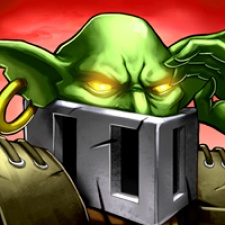It's a measure of the success of mobile strategy games that the genre is also the most one of the most competitive.
Supercell's Clash of Clans and Machine Zone's Game of War currently rule the charts, but there are plenty of upstarts hungry to dethrone them.
One such is Nonstop Games.
Based in Singapore, but founded by four Finnish mobile veterans, it's looking to synergise the best of the West and the East.
We spoke to president Henric Suuronen about the experience of designing, launching and operating its debut title, real-time strategy game Heroes of Honor.
Pocket Gamer: You're a bunch of Finns based in Singapore, so can you explain a bit about the formation and choice of location for the company?
Henric Suuronen: Good question! We get that a lot. When we started the company, all four of us co-founders were living in different cities. I was in Berlin as I was head of studio at Wooga. Juha (our CEO) was in Singapore working with Nokia, and the two technical co-founders were in Finland.
We thought for a long while which would be the perfect location for the studio as it could have been Helsinki, Berlin, San Francisco or any place where we had good networks.
In the end, we chose Singapore when we decided that the unique approach of our game studio would be to combine the best of Western and Eastern game design. As you may know, F2P games were made popular in Asia, and we felt that to really learn the Eastern secrets of F2P games, we would have to be there ourselves and employ the best local talent from China, Japan and Korea.
Singapore is the perfect hub for this due to its location, stability, safety and high standard of living.
Singapore is the perfect hub for this due to its location, stability, safety and high standard of living, enabling us to attract Eastern talent to complement our own Western knowledge.
For example, our lead artist and lead game designer in Heroes of Honor are both local. We are very happy and proud of the global mix of talent we have and think it will result in unique and better games.
The Singapore government has also been encouraging start-ups. For example, through flexible work visas, the city-state has had a lot of buzz with recent success start-up stories (such as Viki). Singapore has already attracted gaming giants such as EA and Ubisoft, the latter making big parts of Assassin Creed in Singapore.
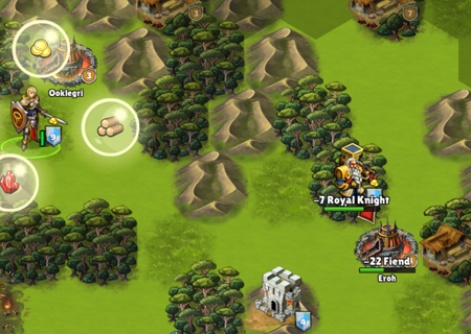
Japanese gaming companies are also building studios in Singapore (e.g. DeNA, Gumi etc). In terms of the gaming industry, we see Singapore as being in a very similar state as Finland was around 4 to 5 years ago. Currently, our studio consists of 17 people, more than half of whom are Asians working in key positions in the company.
The items economy in Heroes of Honor is a direct result of our approach towards combining the best of West and East. The system works really well in both Asian markets (China and Southeast Asia) and Western markets (Germany, France, North America), and is proof that our approach works.
What was your vision in terms of making mobile games?
As mentioned, we set out to create the best F2P mobile and tablet games by combining wisdom, and knowhow from both Western and Eastern game-making.
The West has been good at creating approachable games, UX and UI that work globally (e.g Candy Crush, Clash of Clans, Bejeweled).
As for the East, areas they excel in include advanced item economies (evolvement, fusion etc) and the conducting of in-game events. Some of the best examples here are Puzzle & Dragons, Nexon's Kartrider and Maple Story, and recently, also games like Brave Frontier from Gumi.
And of course, let's not forget Super Mario, by Nintendo. That is one of the few games that has worked globally, and for many of us in Nonstop Games, it is the reason we started working with games. We think this idea of West and East is very attractive, ultimately making F2P games better and more enjoyable.
The second part of our vision is that we want to create games with more "game" - something which can be enjoyed for years to come, very much like World of Warcraft.
We want to create games that mean something to our players. Games where players can make friends, build an identity. Games which are more than just a mere game, and which becomes an integral part of the player's life. We see this happening in Heroes of Honor already, with players in many alliances becoming good friends, and some even arranging real-life meet ups.
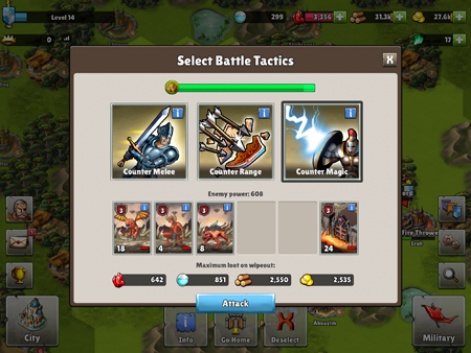
The third part of our vision is to push the boundaries of F2P games. For us, it is very important that every single asset, weapon or power-up in the game is achievable by playing and not only by paying. For example in Heroes, many of the top players in the different worlds have spent no money or very little money in the game. This is very important for us. We aim to design fun games that can be enjoyed equally by both paying and non-paying players.
We also believe that our design philosophy of West and East does not only work in strategy games but also in other genres.
So as a result, we recently announced that we will start production of a casual arcade game. For that, we spent a lot of time thinking of what is the next Candy Crush or Puzzle & Dragons-type of phenomenon in the casual space. After many, many developed prototypes we think we have found something very cool that could be it.
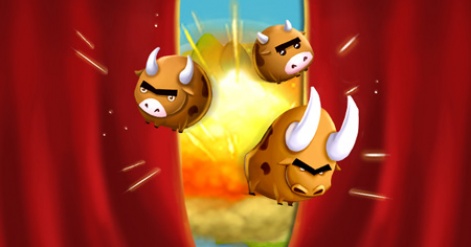
In addition to the new arcade title, we have also started another new strategy title where we build upon on what we learnt with Heroes of Honor. We are super excited about these two new titles. We actually, have just released a short blog-post talking about our new games. This can be found on our official website.
You've highlighted Heroes of Honor as being the first synchronous strategy game on mobile, so why do you think that feature is so important?
Great question. There are other synchronous games on mobile (some FPSes and other strategy games) but, to our knowledge, there are no games with a world map where the battles happen in real-time and others around the world can see the action.
We think that engagement and social interaction reaches a whole new level when you can collaborate with your friends and alliance members in real-time.
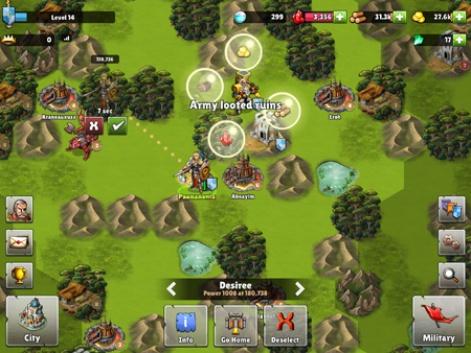
For example, players can plan an attack on a demon city and agree on who goes first, second etc. All these actions can be seen in real-time by the players there, and the feeling is awesome. Events like these happen all the time in Heroes of Honor.
Currently, players are engaging in 50 battles per day on average and chat activity as a result is very high. In the 5-star reviews that we have gotten on the App Store, many players highlight that the real-time action is the key value driver when comparing Heroes of Honor to other strategy games, such as Clash of Clans.
This real-time feature enables teamwork and gameplay of a totally different level, which players love.
The look and style of game seems close to browser games, so how much inspiration did you take from this genre?
We contemplated the graphical style a lot before finally finding something we liked as a team. Yes, some games we liked, such as Heroes of Might & Magic, Kingdoms of Camelot, Clash of Clans and old browser games like Travian, Evony and others served as a reference.
But we wanted to find our own style and cater to different tastes with the different factions. We see hardcore players choosing the darker Shadow faction, while more casual players tend to choose the Imperials.
When did you start working on the game, and how much prototyping did you do before deciding you had the right idea to go into full production?
We started working on the prototypes for Heroes of Honor in August 2012 with just two to three guys on the project. It was released globally on 17 of January 2014, nearly one and a half years later.
We did many prototype iterations (around eight to 10) before deciding to start production. In the prototypes, we were mainly testing the real-time battle map and seeing whether we could make it work on mobile, where the screen sizes are small and where there can be network lag.
Getting this right was critical for the game to work and we are very happy with the final outcome.
What were the key challenges you had to overcome during development?
There are many challenges to overcome in an MMO like Heroes of Honor.
Firstly, we were seriously under-staffed for a game of this size and complexity. We see competing games like Game of War having a team size of 70 to 80, whereas we had about eight to nine guys in the Heroes of Honor production team. But that is one of the fun challenges of being a small start-up.
How do you ensure older players don't raid newer players without limiting the freedom and gameplay?
Then there were pure game design challenges such as bullying, which are very difficult to solve. For instance, how do you ensure older players don't raid newer and weaker players without limiting the freedom and gameplay too much? This has probably been our greatest challenge, but we eventually managed to overcome it.
There were numerous other smaller challenges to overcome, such as progression speed, battle system balancing and economy balancing, though they are key challenges in pretty much any project and are also a big part of the fun in development.
Did you learn anything during the soft launch process and did you make any changes to the game because of this?
We actually had the game in Singapore soft launch for six months before doing a soft launch in Canada. So yes, we learnt a lot. Through the soft launch, we saw the problems of bullying, progression speed and the battle system.
We have also invited about 50 players to our office for direct feedback on what worked and what did not work in the game. That feedback was crucial in solving the challenges and we are very grateful for the early user base we have in Singapore.
The ability to invite real players to our office was a big driver for us to have the first soft launch in Singapore.
What's your approach to monetisation? How did you design it into the game, and have you been happy with the way it's been working, particularly the use of a percent fill conversion for soft currencies?
As mentioned earlier, our approach to monetisation is really free-to-win. Everything in the game can be achieved without paying a dime. But even before thinking of monetisation drivers, we just wanted to create a fun game.
We thought about what makes a game really fun, and felt that it is the social interaction and teamwork in alliances, collaborated attacks and real-time action on the map. The players who came to the office gave us the same feedback. So with that in mind, we thought about how to prolong the fun and objective of the game.
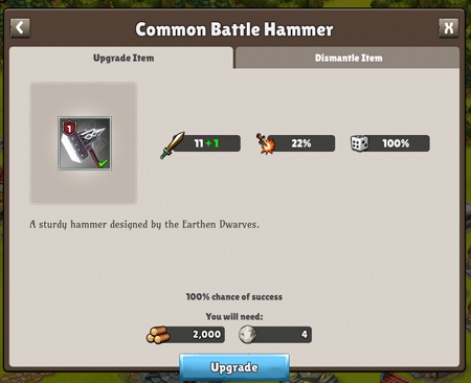
After being in soft launch for a while, we then introduced the Equipment System to the game. There is no direct way to buy equipment, and players earn equipment by attacking demon cities, which have a chance to drop a valuable equipment design.
We saw this feature double player activity per day in the game, pushing time spent per user to over 90 minutes per day, spread across multiple sessions. Even though, at first glance, the Equipment System may seem like a monetisation feature, it is actually a lot more important for engagement and retention.
We have been happy with the approach to the monetisation. You can succeed in the game without paying a dime but many of our users chose to pay as well. There is a great mix of features that do monetise in the game, such as upgrade speed-ups and purchasing resources and shields.
The ability to refill a Hero's supplies may seem like a monetisation feature, but in reality it does not monetise that much. This feature was implemented not for monetisation, but as a necessary progression speed limit, and for that it works. It levels out the difference of strength of players who can play 10 hours a day compared to those who play for one hour a day.
Regarding the percent fill for soft currencies, we think it works well, it could be better though as on high levels the price points do get too high (because of the sheer amount of resources a certain percentage represents).
In terms of the base building part of the game, there are little customisation options. For the player, it's more of an abstract upgrade situation. Given the success of base-building games such as Clash of Clans, why did you decide not to provide more strategy in this part of the game?
This was a game vision choice for us as we wanted to have the battles happening in real-time on the map for all players to see. We did not want battles to take place within the city, like in Clash of Clans.
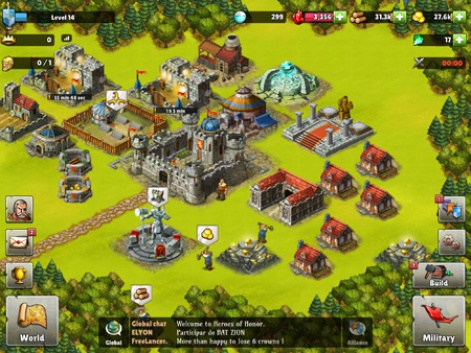
The unique selling point of the game is the active real-time map - whenever you go to the world map, you can see real players battling there. If we had moved the attacks into the city, there would be less action on the map. You would also not be able to control multiple heroes strategically (since you would be locked inside a city view).
Additionally, we did not want to create another Clash of Clans game, but something original.
You have a complex layering in terms of the game's resources - from wood and gold, to the various type of orbs, and now different units of wood and gold too. Why did you decide to take this approach, especially given that the link between the orbs and the hard currency is indirect?
Great question. The orbs are linked to the equipment, and a key reason why the equipment system actually works. The orb refining and its associated cooldowns level out the difference between the player who plays 10 hours a day and the player who plays for an hour a day.
We were originally going for a more straightforward equipment-fusion system (without orbs), but that would allow highly active players to advance way too fast to the best items and crush the other players. This point is very important in a game like Heroes of Honor, where players can chose their opponents. In games like Clash of Clans which utilize matchmaking, you don't have to worry as much about this factor of players who play for different amounts of time.
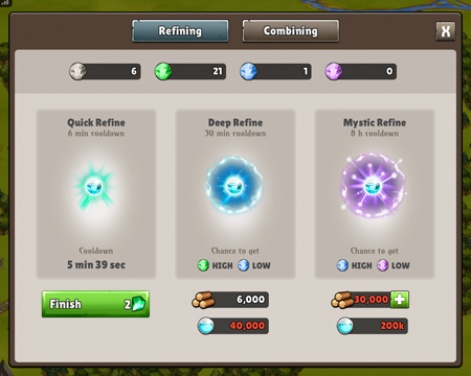
The recent implementation of 'Materials' or 'Units of gold and wood', as you call them, is to help growing players protect their resources. For example, saving up for a high-level castle upgrade (which can cost up to one million wood and gold) might be impossible for someone who constantly gets raided. Now, with Materials, players can reach intermediary milestones and save up for the upgrade a bit at a time, without losing everything when they get raided.
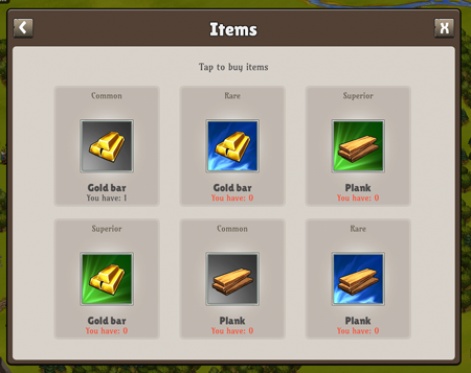
A downside to this is that the game gets more complex. However, as Materials come in only in the later part of the game, new players have time to get used to the core gameplay first.
Most games split out PvE and PvP into different modes so why did you decide to mix PvE and PvP gameplay into the same map screen? Do you think this ends up downplaying the importance of the PvP element?
Many real-time games suffer from what we call the "empty lobby syndrome". You log in and you can't see anyone in the real-time map. As the real-time aspect is our main selling point, we wanted to avoid this problem.
The world map in Heroes of Honor is very lively and you see battles happening all the time. If we had separated PvP and PvE on different maps this would most likely not be the case.
Currently, about 20 percent of attacks in the game are PvP. We have tried different things and found out that when the percentage goes higher than this, the game starts to suffer from bullying and is very taxing to more casual players.
What is great about PvE is that it offers cooperative gameplay. Alliances attack demon cities together and the strong players go first to tank the damage, then let weaker players finish the demon city to get the loot and items.
This similar strategy for PvE can be seen taken by Supercell in Boom Beach, where the importance of PvE has been greatly increased compared to Clash of Clans. Also looking at most Asian games, PvE is as important or even more important than PvP (for example Puzzle & Dragons).
How do you view the first couple of months of the game's launch?
We launched the game globally on 17 January and we are very happy about the support we received from Apple. The game was featured globally in over 144 countries, being Editor's Choice in mainland China and Southeast Asia. To us, this alone was a great sign that Apple too has been waiting for games to deliver something new, which in our case is the real-time map that pushes the boundaries of what people can expect from a mobile game.
Over half a million players around the world have downloaded the game and gotten very engaged.
To us, it is very positive that the markets which are most engaged are also the most revenue driving markets. We see the game working really well in markets such as China, Southeast Asia, Russia, Germany, France and North America.
It is very positive that the markets which are most engaged are also the most revenue driving markets.
In fact the game is doing so well that it makes our small start-up profitable, which is great as we can continue improving and developing Heroes of Honor. The global success of the game is also nice in the sense that it proves that our approach of making global games through combining the best of West and East is working.
Why do you think you've done well in the Eastern Europe and the German-speaking countries?
German-speaking markets have traditionally been very good for strategy games. Many games in the genre have even been made in Germany (e.g. Travian). Same goes for Poland and many countries in Eastern Europe.
Prior to launch, we had a feeling Heroes of Honor would work really well there and we currently see the game performing extremely well in Germany, Austria and Switzerland.
Russia is also great for us. What we are extremely happy about is that these markets have also embraced the equipment system we have in Heroes of Honor. This tells us that you can bring Asian game mechanics to Western markets.
We also believe that our high quality German translations for the game, along with our dedicated German players, have helped us succeed in the German speaking market.
What have been the key areas of the game you've been updating?
Right after launch we fixed many issues related to bullying and player progression. We had already resolved many of these in the soft launch, but as the user numbers grew we found new problematic areas.
After those were fixed, we began focusing on bringing improved alliance features to the game. The latest update brought new, exciting alliance features, such as contributions and an alliance shop, and has been very positively received by the player community.
We have also added an event feature to the game, enabling us to hold exciting events every week. The events system is actually one of the biggest things which we have learned from Asian games, as events are crucial for player engagement and retention.
We are very happy with the results of events so far. To us running a game is so much more than just making feature updates. It is also about running events, delivering new content, new items, engaging the community and much more.
Have you been surprised about reaction to the game in any way?
Yeah, in some cases it is quite a surprise how emotional players can get, for instance, when being attacked in the game. After all, Heroes of Honor is a war game.
But out of that emotion comes also good things - these players really live the game. It is very fun to see how real friendships are formed in the realms of the game. That really feels good and lets us know that we have made an impact on the lives of our players.
How do you think Heroes of Honor compares to games like Clash of Clans and Game of War, which are the current leaders in this genre?
Both Clash of Clans and Game of War are of course huge success stories on a totally different magnitude from Heroes of Honor.
Many of our most engaged players are actually former Clash of Clans or Game of War players.
In terms of strategy games on mobile, those games are definitely the leading ones. However, we are still proud to have brought something fresh to the market, and many of our most engaged players are actually former Clash or Game of War players. Many of them have wanted something more strategic, social or a game which is really in real-time.
We are still improving Heroes of Honor, while also building a new strategy title where we can incorporate what we have learned from Heroes of Honor. Our ambition is to be in the top 5 grossing charts for mobile games, right there with Clash of Clans and Game of War, so time will tell if the answer to this question differs next year. :)
As you're based in Singapore, what are you plans in terms of promoting the game in Asia?
We have not done much in terms of paid promotion for Heroes of Honor yet, but as we move forward we will be using traditional mobile promotional channels, very much like our competitors.
We have also seen great traffic coming from Facebook news-feed ads because of their amazing targeting options. It is obvious that a game such as Heroes of Honor will likely resonate with someone who is also into World of Warcraft or other strategy titles. Facebook lets you target those users and we see this working very well.
Of course in Asia, and particularly in Japan, you see TV ads and prints for games as well. However we are not yet at the scale that we could do those things. Still, it is very interesting to get exposed to that here, as Western game companies like Supercell and King are already following the Japanese companies on that front.
What's next for Nonstop and Heroes of Honor?
We are still improving the Heroes of Honor with new feature updates every month, along with fun and very engaging weekly events. Something we also are very excited about is bringing Heroes of Honor to Android and maybe even some desktop platforms.
Our unique technology platform allows us to have the same game on all platforms, and have the world's first truly cross-platform game. A lot of our users have already expressed their excitement of being able to have Heroes of Honor open in a tab in their browser while being at work.
As a start-up of 17 people, we are very proud to bring the first game of this kind to the market. Exciting times lie ahead!
Thanks to Henric for his time.
You can check out Heroes of Honor here. [iTunes link]

